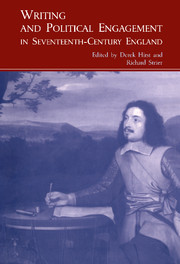Book contents
- Frontmatter
- Contents
- Notes on contributors
- Dedication
- Introduction
- 1 “I am Power”: normal and magical politics in The Tempest
- 2 “Void of storie”: the struggle for insincerity in Herbert's prose and poetry
- 3 Sir Kenelm Digby's rewritings of his life
- 4 Thomas Hobbes and the Renaissance studia humanitatis
- 5 Casuistry and allegiance in the English Civil War
- 6 Thomas May and the narrative of civil war
- 7 Samuel Parker, Andrew Marvell, and political culture, 1667–73
- 8 Sidney's Discourses on political imagoes and royalist iconography
- Notes
- Index
Introduction
Published online by Cambridge University Press: 09 September 2009
- Frontmatter
- Contents
- Notes on contributors
- Dedication
- Introduction
- 1 “I am Power”: normal and magical politics in The Tempest
- 2 “Void of storie”: the struggle for insincerity in Herbert's prose and poetry
- 3 Sir Kenelm Digby's rewritings of his life
- 4 Thomas Hobbes and the Renaissance studia humanitatis
- 5 Casuistry and allegiance in the English Civil War
- 6 Thomas May and the narrative of civil war
- 7 Samuel Parker, Andrew Marvell, and political culture, 1667–73
- 8 Sidney's Discourses on political imagoes and royalist iconography
- Notes
- Index
Summary
Festschrifts are suspect. They are often motivated more by personal affection than by intellectual kinship, and they are therefore often mere miscellanies. This volume is and is not a tribute to John Wallace. Although the contributors were all friends of Wallace's, their intention is to pay tribute to work they continue to admire rather than to the man whose loss they have mourned. There is accordingly a true intellectual kinship among the contributors in their sense of kinship with Wallace's work, especially his book, Destiny His Choice: The Loyalism of Andrew Marvell (1968). That book demonstrated the inadequacy of the (mostly) discipline-bound scholarship that then flourished in Departments of History and English on both sides of the Atlantic; it represented a virtuoso integration of texts and contexts. These features will inevitably seem less remarkable now that a whole generation since has added rich examples and approaches to contextual and historical reading. Even more important, however, than an interdisciplinary method that showed how the timeless and the time-bound could be held in balance and made to illuminate each other is the example of Wallace's reconstruction of an intellectual and political world from the point of view of a recognizable person. Wallace took as his subject a poet and a polemicist, Andrew Marvell, who had the fortune to live through interesting times.
- Type
- Chapter
- Information
- Publisher: Cambridge University PressPrint publication year: 2000



